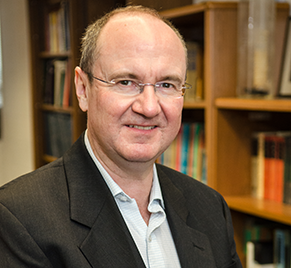In his first six months as a clinical virologist at the University of Oxford, in 1988, Douglas F. Nixon, M.D., Ph.D., identified part of the Human Immunodeficiency Virus (HIV) that could stimulate a white blood cell. It was a substantial finding at the time, and the first of many for Nixon, the renowned HIV/AIDS researcher and educator who was installed as the Walter G. Ross Professor of Basic Science Research at the George Washington University School of Medicine and Health Sciences (SMHS) March 19.

“Dr. Nixon is tackling some of the world’s biggest challenges, and his exceptional work holds real promise for improving the lives of hundreds of millions of people,” said Jeffrey S. Akman, M.D. ’81, RESD ’85, Walter A. Bloedorn Professor of Administrative Medicine, vice president for health affairs, and dean of SMHS, in his opening remarks.
Nixon, who was named chair of the Department of Microbiology, Immunology, and Tropical Medicine at SMHS in October 2013, leads the school’s Research Center for Neglected Diseases of Poverty and its Center for Basic Research and Prevention of HIV/AIDS. Beyond Foggy Bottom, he also serves as chair of the National Institutes of Health (NIH) AIDS Vaccine Research Subcommittee.
Once the professorship was officially conferred, Nixon remarked that “it’s actually about all of us, because we’re here to work toward eliminating diseases that are causing suffering in many places around the world.
“No one individual is going to make this breakthrough,” Nixon remarked, in closing. “We all come up with ideas. Ideas are frequent. But actually putting things into practice requires groups to work together and to set common goals. We want to cure AIDS. It’s time to end HIV.”



